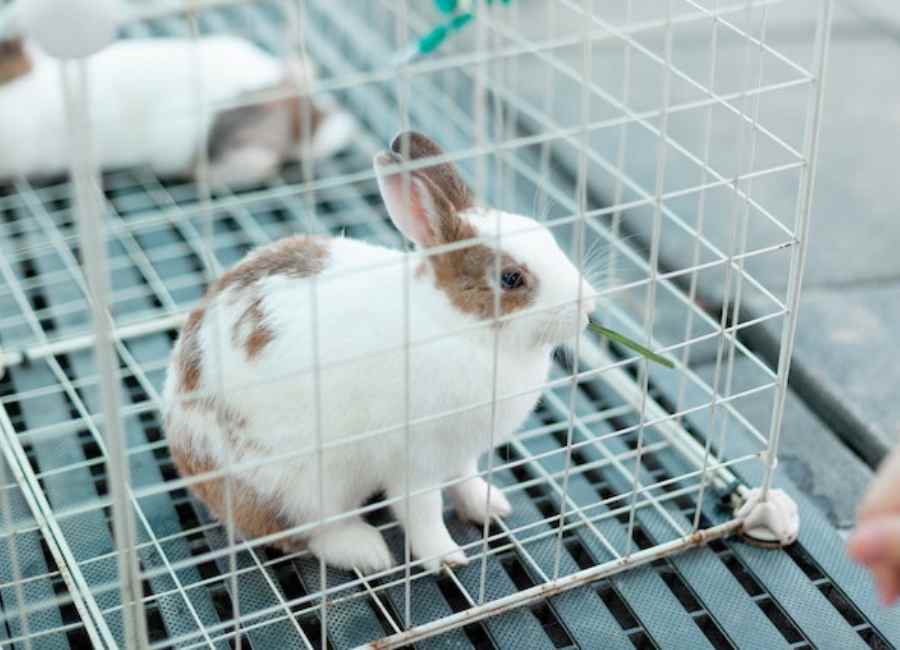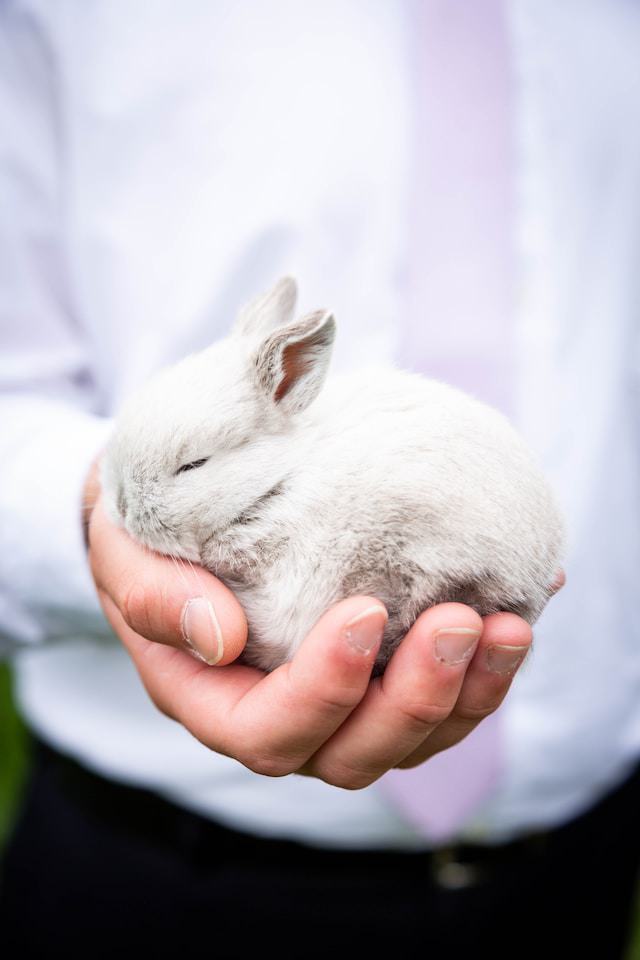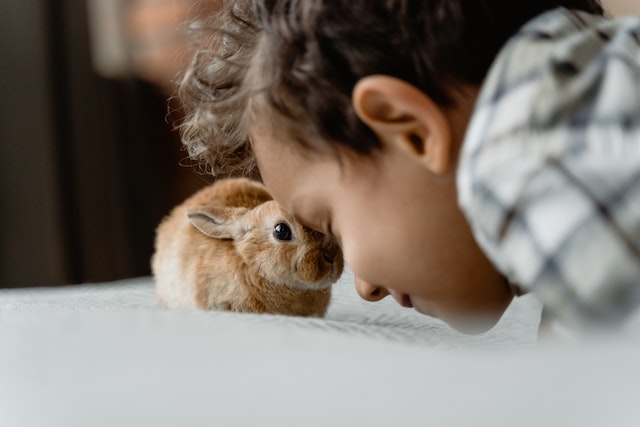14 Potential Signs of a Stressed Rabbit & Tips

Let’s discuss the signs of a stressed rabbit…
Is your furry friend feeling a little stressed lately? It might be time to check for signs of stress in your beloved rabbit. Just like us, rabbits can also experience stress, and it’s important to be aware of the signs to ensure their well-being.
In this blog post, we’ll dive into the world of our fluffy companions and explore the subtle cues that indicate when they’re feeling overwhelmed.
Signs of a Stressed Rabbit
Signs of a stressed rabbit may include decreased appetite, excessive grooming or fur pulling, and changes in behavior such as aggression or withdrawal.
Other signs may include hiding, teeth grinding, and reduced activity levels. It’s important to monitor your rabbit closely and provide a calm and safe environment to help alleviate stress.
Let’s dive deeper for a better understanding…
Here are some signs of a stressed rabbit:
1. Unusual Aggression
Visualize a scenario where your typically affectionate rabbit exhibits unexpected aggression, be it growling, biting, or charging. While rabbits are generally gentle, aggression can emerge as a response to heightened stress.
Their natural communication relies heavily on body language, and aggression may serve as a defense mechanism against perceived threats. Understanding their cues and attempting to identify potential stressors can help mitigate this atypical behavior.
2. Altered Grooming Habits
Picture a rabbit incessantly licking itself, leading to the development of bald patches on its once-fluffy fur. Over-grooming is an alarming sign often linked to stress. This compulsive behavior stems from their innate grooming habits, which intensify in response to stressors.
The physical manifestations of over-grooming highlight the emotional strain your rabbit is undergoing. Identifying and addressing the underlying stressors are crucial to preventing further discomfort.
3. Lack of Interest in Play
Imagine your lively rabbit, usually engaged in playful hopping and exploration, suddenly displaying disinterest in their usual games. This marked shift in behavior could be an indication of stress.
Rabbits thrive on mental stimulation and physical activity, and a lack of enthusiasm for playtime can be attributed to underlying tension. Encouraging their natural curiosity with novel toys and interactive sessions may help alleviate their stress.
4. Changes in Litter Box Habits
Visualize a situation where your well-trained rabbit starts displaying uncharacteristic litter box behavior, such as avoiding their designated space or having frequent accidents. Rabbits find comfort in established routines, and any deviation from their regular habits could signify underlying stress.
Environmental changes, health issues, or heightened anxiety can trigger these alterations. Observing these changes and addressing them promptly can help maintain your rabbit’s emotional and physical well-being.
5. Fur Puffing
Envision your rabbit’s fur standing on end, creating an appearance of puffiness. This physical transformation, known as fur puffing, is a clear manifestation of agitation.
In times of stress, rabbits instinctively puff up their fur to appear larger, a survival mechanism inherited from their wild ancestors. Recognizing this behavior is crucial, as it serves as a visible cue indicating their discomfort.
6. Excessive Thumping
Picture your rabbit dramatically thumping their hind legs against the ground, emitting a resonating sound throughout their surroundings. While this behavior has its roots in their natural warren communication, excessive thumping can be a sign of chronic stress.
When stressors persist, rabbits might express their unease through repeated thumping. Identifying and addressing the root causes is essential for ensuring your rabbit’s well-being.
7. Digestive Issues
Imagine your rabbit displaying irregularities in their digestive patterns, such as diarrhea or inconsistent bowel movements.
These digestive disruptions can often be traced back to stress. The mind-body connection in rabbits is profound, and stressors can have a direct impact on their gastrointestinal health.
Monitoring their bathroom habits closely and seeking prompt veterinary attention when needed can help safeguard their overall well-being.
8. Change in Eating Habits
Imagine this scenario: your once-eager rabbit, who used to dash excitedly to their food bowl, now hesitates or seems indifferent towards their usual treats. Such an abrupt alteration in eating habits is often an early indicator of stress.
Rabbits’ appetites are sensitive indicators of their well-being, making it crucial to monitor their food consumption closely. A decline in eating could be a direct response to an underlying stressor, and addressing it promptly is vital to maintaining their health.
9. Hiding Away
Consider the contrast of your once-sociable bunny, who thrived on interaction, and has now retreated to the confines of their burrow, exhibiting a desire for solitude. This behavior underscores the significance of social engagement in a rabbit’s life.
Rabbits are inherently social creatures, and sudden isolation may signal that they are grappling with stressors. Providing a calm, secure environment and a gradual reintroduction to companionship can help alleviate their stress.
10. Restlessness
A rabbit’s restlessness, manifesting as persistent pacing or ceaseless circling, can be a visible expression of their stress levels.
Restlessness is often an outlet for pent-up stress, and observing your rabbit displaying these behaviors over an extended period warrants investigation into potential stressors.
11. Reduced Playfulness
The boundless energy and playfulness of rabbits are telltale signs of their happiness. Thus, if your once lively and spirited rabbit displays lethargy, disinterest in toys, or reluctance to engage in familiar activities, it’s an indication of their emotional upheaval. A noticeable dip in their usual enthusiasm could point to stress.
12. Elevated Heart Rate
While we can’t feel their pulse, observant bunny parents may notice subtle physical cues that indicate heightened stress. A rabbit’s heart rate can increase noticeably when they are anxious or fearful.
Pay attention to any signs of rapid breathing or a visibly accelerated heartbeat, especially if there are no apparent external triggers such as loud noises or sudden movements.
13. Excessive Shedding
While shedding is a natural phenomenon for rabbits, excessive shedding outside of their usual shedding season can be an outward manifestation of internal stress.
This heightened shedding can lead to a change in their coat’s texture, indicating that their emotional well-being is taking a toll on their physical health.
14. Lethargy
Picture your energetic and lively bunny choosing to spend more time lounging rather than engaging in their usual playful antics. This shift in behavior, marked by a lack of enthusiasm for activities they once relished, is a hallmark of stress-induced lethargy.
Stress can drain their energy and enthusiasm, leading to a noticeable decrease in their activity levels.
Causes of Stress in Rabbits

Rabbits, like any other animals, can experience stress in various situations. Here are some common causes of stress in rabbits:
- Environmental changes: Rabbits are sensitive to changes in their environment, such as moving to a new location, changes in temperature or lighting, or even rearranging their living space.
- Loud noises: Rabbits have sensitive hearing, and loud noises like fireworks, thunderstorms, or construction work can cause stress and anxiety.
- Predator threats: Rabbits are prey animals and can become stressed when they feel threatened by predators or even the presence of other animals.
- Crowded or limited space: Rabbits need enough space to hop, stretch, and exercise. Overcrowding or confining them to small enclosures can lead to stress.
- Handling and restraint: Improper or rough handling can cause stress in rabbits. It’s important to handle them gently and properly to avoid causing fear or injury.
- Loneliness or social isolation: Rabbits are social animals and thrive in the company of other rabbits. Being kept alone or without enough social interaction can lead to stress and behavioral issues.
- Changes in routine: Rabbits are creatures of habit and can become stressed when their daily routines are disrupted, such as changes in feeding schedules or lack of consistency in their care.
- Illness or injury: Rabbits can experience stress due to underlying health issues or pain from injuries. It’s important to provide proper veterinary care and monitor their health closely.
- Introduction of new rabbits: Introducing new rabbits to an existing group can cause stress, as it disrupts the established hierarchy and can lead to territorial behavior and aggression.
It’s crucial for rabbit owners to be aware of these common causes of stress and take steps to minimize them. Providing a safe and comfortable environment, social interaction, and regular veterinary care can help reduce stress and promote the well-being of rabbits.
Learn more about identifying a happy rabbit.
Ways to Address Stress in Rabbits

Rabbits can be easily stressed out by their surroundings, and it’s important to address and reduce stress in order to maintain their well-being.
Here are some ways to address stress in rabbits:
- Provide a safe and comfortable environment: Ensure that your rabbit has a clean and spacious living area with appropriate bedding and hiding spots. A calm and secure environment can help reduce stress.
- Establish a routine: Rabbits thrive on routine, so try to establish a consistent schedule for feeding, playtime, and social interactions. This can help create a sense of stability and reduce stress.
- Minimize loud noises and sudden movements: Rabbits are sensitive to loud noises and sudden movements, which can startle and stress them. Try to minimize these disturbances in their environment to create a more peaceful atmosphere.
- Handle your rabbit gently: When handling your rabbit, be gentle and calm. Avoid sudden movements and loud voices. This will help your rabbit feel safe and secure during interactions with you.
- Provide appropriate socialization: Rabbits are social animals, and they benefit from social interactions. However, it’s important to introduce new people and animals gradually and in a controlled manner to prevent overwhelming your rabbit.
- Offer enrichment activities: Provide your rabbit with toys, tunnels, and chewable items to keep them mentally stimulated and engaged. This can help alleviate stress and prevent boredom.
- Ensure a balanced diet: A healthy and balanced diet is essential for a rabbit’s well-being. Provide a diet that includes fresh hay, vegetables, and a limited amount of pellets. Consult with a veterinarian to ensure that your rabbit’s nutritional needs are met.
- Regular veterinary check-ups: Regular visits to the veterinarian are important to monitor your rabbit’s health and address any underlying medical conditions that may contribute to stress.
- Avoid overcrowding: Rabbits need space to move around and explore. Avoid overcrowding their living area, as this can lead to stress and territorial behavior.
- Provide a quiet retreat: Create a quiet retreat area in your rabbit’s living space where they can retreat and relax when they feel stressed or overwhelmed.
Remember, each rabbit is unique, and it’s important to observe your rabbit’s behavior and adjust their environment accordingly. If you notice persistent signs of stress or have concerns about your rabbit’s well-being, it’s best to consult with a veterinarian experienced in rabbit care for further guidance and support.
Learn more about how to show your rabbit you love them.
Related Questions
How can I tell if my rabbit is stressed?
Observing your rabbit’s behavior is key to identifying signs of stress. Look for changes in eating habits, such as loss of appetite or excessive drinking. Anxious rabbits may also display aggressive or timid behavior, and they might become more vocal or hideaway. Keep an eye out for fur pulling, over-grooming, or even self-harm, as these could be indications of stress.
What are some common triggers for rabbit stress?
Rabbits are sensitive creatures, and various factors can stress them out. Some common triggers include loud noises, sudden changes in their environment, an unfamiliar or overcrowded living space, lack of socialization, and even the presence of predators, like dogs or cats. It’s important to maintain a calm and stable environment for your furry friend.
How can I help reduce stress in my rabbit?
Creating a stress-free environment is crucial. Make sure your rabbit has a quiet and secure space to retreat to, with hiding spots and cozy bedding. Provide plenty of opportunities for exercise and mental stimulation, such as toys and tunnels. Additionally, ensure a proper diet and hygiene routine, and spend quality time bonding with your rabbit through gentle petting and play.
Learn more about identifying a sad rabbit.
Can stress affect my rabbit’s health?
Yes, prolonged stress can have adverse effects on your rabbit’s health. It can weaken their immune system, making them more prone to illnesses. Stress can also lead to digestive issues, such as diarrhea or a loss of appetite. If left unaddressed, chronic stress can have serious consequences for your rabbit’s overall well-being.
Are there any natural remedies for stressed rabbits?
There are a few natural remedies that may help alleviate stress in rabbits. Providing a calm and soothing environment with soft music or white noise can be beneficial. Additionally, herbal remedies like chamomile or lavender can have a calming effect. However, it’s always best to consult with a veterinarian before introducing any new treatments.
When should I seek professional help for my stressed rabbit?
If you notice persistent signs of stress in your rabbit, or if their behavior changes dramatically, it’s essential to consult a veterinarian who specializes in rabbit care. They can evaluate your rabbit’s health, identify the underlying cause of stress, and recommend appropriate treatment options to ensure your furry friend’s well-being.
Learn more about the reasons why your rabbit is not eating.
Conclusion
In conclusion, it’s important to keep a close eye on our furry friends and recognize the signs of stress in rabbits. If you notice changes in behavior, such as excessive grooming, loss of appetite, or aggression, it could be a clear indicator that your bunny is feeling overwhelmed.
Remember, rabbits are sensitive creatures and it’s our responsibility as pet owners to create a calm and peaceful environment for them. By providing plenty of hiding spots, gentle handling, and regular playtime, we can ensure our rabbits stay happy and stress-free. So, let’s be attentive and proactive in caring for our beloved bunnies!
